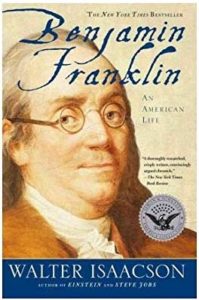On the second page of his biography of Benjamin Franklin, Walter Isaacson offers a thumbnail sketch of his subject: “He was, during his eighty-four-year-long life, America’s best scientist, inventor, dimplomat, writer, and business strategist, and he was also one of its most practical, though not most profound, political thinkers. He proved by flying a kite that lightning was electricity, and he invented a rod to tame it. He devised bifocal glasses and clear-burning stoves, charts of the Gulf Stream and theories about the contagious nature of the common cold. He launched various civic improvement schemes, such as a lending library, college, volunteer fire corps, insurance association, and matching grant fund-raiser. He helped invent America’s unique style of homespun humor and philosophical pragmatism. In foreign policy, he created an approach that wove together idealism with balance-of-power realism. And in politics, he proposed seminal plans for uniting the colonies and creating a federal model for a national government.” The rest of the book, just shy of 500 pages, fills in the details of this set of characterizations. Some of Isaacson’s assertions are debatable — that homespun humor or philosophical pragmatism are unique to America, for example — but his characterization of Franklin is accurate, and carries through the narrative of his life.
But wait, there’s more! as Franklin himself might say. “But the most interesting thing that Franklin invented, and continually reinvented, was himself. America’s first great publicist, he was, in his life and writings, consciously trying to create a new American archetype. In this process, he carefully crafted his own persona, portrayed it in public, and polished it for posterity.” (p. 2) Throughout the book, Isaacson gives examples of how shrewdly Franklin cultivated other people’s perceptions of himself and his work and ideas. “As a young printer in Philadelphia, he carted rolls of paper through the streets to give the appearance of being industrious. As an old diplomat in France, he wore a fur cap to portray the role of backwoods sage. In between, he created an image of himself as a simple yet aspiring tradesman, assiduously honing the virtues—diligence, frugality, honesty—of a good shopkeeper and beneficent member of his community.” (pp. 2–3)
Isaacson begins his story of the many different Ben Franklins by looking in on the part of England where the family came from. The earliest attested Franklin, one Thomas born around 1540, Benjamin’s great-great-grandfather, showed, in family lore, both the independence and inventiveness that would be Benjamin’s trademarks. The family “was early in the Reformation,” Isaacson quotes B. Franklin writing (p. 5), and retained a vernacular Bible when Queen Mary tried to return England to Catholicism. Thomas hid it on the underside of a stool; it could be produced readily for reading, and hidden quickly if the need arose. Looking at the male line of Franklin, Isaacson concludes, “The family produced dissenters and non-conformists who were willing to defy authority, although not to the point of becoming zealots. They were clever craftsmen and inventive blacksmiths with a love of learning. Avid readers and writers, they had deep convictions-but knew how to wear them lightly.” (p. 6)
These themes continue throughout Isaacson’s sympathetic, pleasantly written account of Franklin’s life. Six of the seven chapters that cover Franklin’s first fifty years are named for a public role that was key to that particular phase of his life. (The exception is the first chapter, which discusses his upbringing; its title is “Pilgrim’s Progress.) Journeyman, Printer, Public Citizen, Scientist and Inventor, and Politician — these chart Franklin’s rise to financial security and then wealth, as well as the widening range of his citizenship, from forming a self-improvement group among fellow young men of Philadelphia through various social innovations to taking an active part in the governance of the colony of Pennsylvania. Isaacson does not gloss over the feuds and disputes, and some sharp dealing, that were part and parcel of Franklin’s career. There was fierce rivalry among printers, newspapers slugging it out over circulation and influence, machinations to secure his role as postmaster. Franklin also took political positions that set him at odds with the colony’s proprietors, the Penn family.
This most American man spent the majority of his life’s second half outside of the country. He was in London from 1757 to 1762 and back there from 1771 to 1775. After the colonies declared their independence, he was in Paris from 1776 until 1785, after the Revolution was won and the peace treaty concluded. He returned for the last five years of his life, the sage of Philadelphia and a guiding spirit of the Constitutional Convention that finally gave the colonies a working government, a republic, if they could keep it.
Franklin’s many aspects complemented each other. The scientist guided the inventor; the printer supported and informed the politician; the businessman kept the diplomat in rein. The publicist made sure that all of them were known. Franklin’s early writings on lightning and proposals for a lightning rod were quickly translated into French. Isaacson does not spell out exactly how this came to pass, but it was most fortuitous for Franklin’s — and perhaps America’s — future. His theories were quickly proved correct, and lightning rods built based on his ideas soon prevented strikes turning into fires, a scourge that had plagued people for centuries. This invention, and his reputation as the man who tamed electricity, assured his fame across France. His fame, in turn, gave him entree to every level of French society when he eventually arrived as an envoy.
Franklin’s family life tended toward the irregular. His marriage to Deborah was sensible and pragmatic. He showed more practicality than affection in his letters to her, and from 1757 onward he was overseas far more than he was in Philadelphia. She did not accompany him to Europe, and died in 1774 while Benjamin was in England. Together, they raised their daughter Sally and Benjamin’s illegitimate son William. Another son, Franky, died of smallpox at the age of four. In both England and France, Franklin tended to set up alternative households, having a housekeeper with whom he was quite close; he was also given to very flirtatious correspondence. Isaacson sketches, for example, the epistolary relationship with his English housekeeper’s daughter who was many years his junior. Benjamin and William eventually split decisively over the Revolution. Benjamin had helped his son become colonial governor of New Jersey. When war came, he chose the Loyalist side; eventually, he was exiled to England. William had an illegitimate son as well, William Temple Franklin, known by his middle name. Temple spent some years in foster care, but eventually during one of his missions to England Benjamin took over custody and in due course informed him of his lineage. In the family split, Temple wound up on his grandfather’s side and served as one of his secretaries during Benjamin’s time as an envoy in Paris.
Like his subject, Isaacson wears his learning lightly. The book does not skimp, but it moves along quickly. He has a keen eye for the telling anecdote, and of course he has a most quotable subject, so he is not shy about quoting Franklin’s writings — especially when Franklin is writing about one of his favorite subjects: himself. The biography captures the times, Franklin’s humor and inventiveness as well as his occasional irascibility, the passions of colonial life and the uncertainty of attempting to rebel against the world’s mightiest empire. He shows how the Enlightenment brought new perspectives not only in philosophy but also in politics and science, how one person could make important contributions in so many disparate fields, and do it with wit and verve.
“When he narrowly escaped a shipwreck as he neared the English coast in 1757, he had joked to Deborah that, ‘Were I a Roman Catholic, perhaps I should on this occasion vow to build a chapel to some saint, but as I am not, if I were to vow at all, it should be to build a lighthouse.’ Likewise, when a town in Massachusetts named itself Franklin in 1785 and asked him to donate a church bell, he told them to forsake the steeple and build a library, for which he sent ‘books instead of a bell, sense being preferable to sound.'” (p. 467)
Optional musical accompaniment to this text: Ben Franklin’s Song (The Decembrists)



2 comments
You would know better than me if Europe has a tradition of homespun humor and pragmatism; I tended to take these assertions uncritically. I recall that Isaacson also described Franklin as intellectually middlebrow, but that seems true of most people who are of a scientific rather than a philosophical bent, and Franklin was definitely the former. He anticipated the rule in American politics that it is not enough to do good; one also has to be seen doing good. His endless desire to talk about himself and promote his own image was something he carried with him into old age, unlike some of us who start out that way but end up being cut down to size by the circumstances of life.
Isaacson has a rare gift for biography. Ben Franklin is not as exciting a subject as Steve Jobs, but he is a much more likable personality, certainly the most lovable figure among the Founding Fathers and the revolutionary heroes. I heard from another source that he wished he could be reborn in a later century to see how the American experiment turned out. I think he would have been pleased with the result.
Author
I think he would be pleased, too, by and large. Not least by the longevity of those compromises cobbled together in the Philadelphia summer. When he was writing Hamilton, Lin-Manuel Miranda tried putting in some bits with Franklin — he would obviously not have been out of place — but he found that Franklin stole every scene and threatened to make off with the whole play. So he couldn’t stay. Though we did get the good Decembrists’ song in recompense.